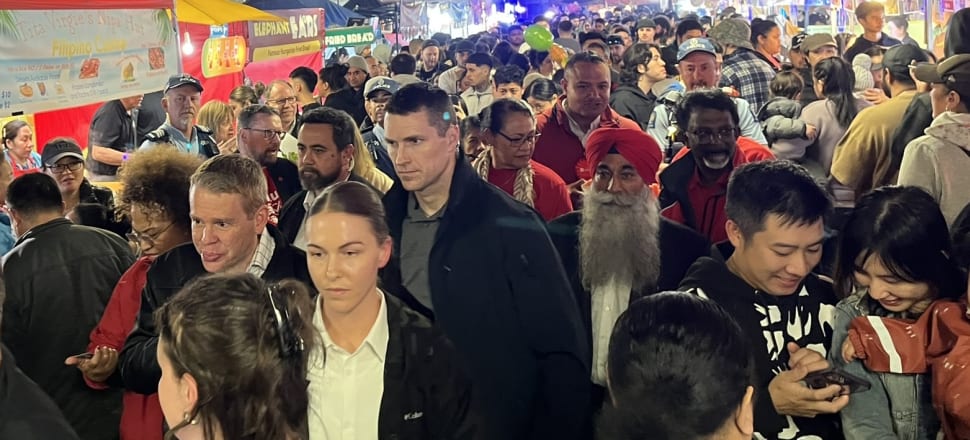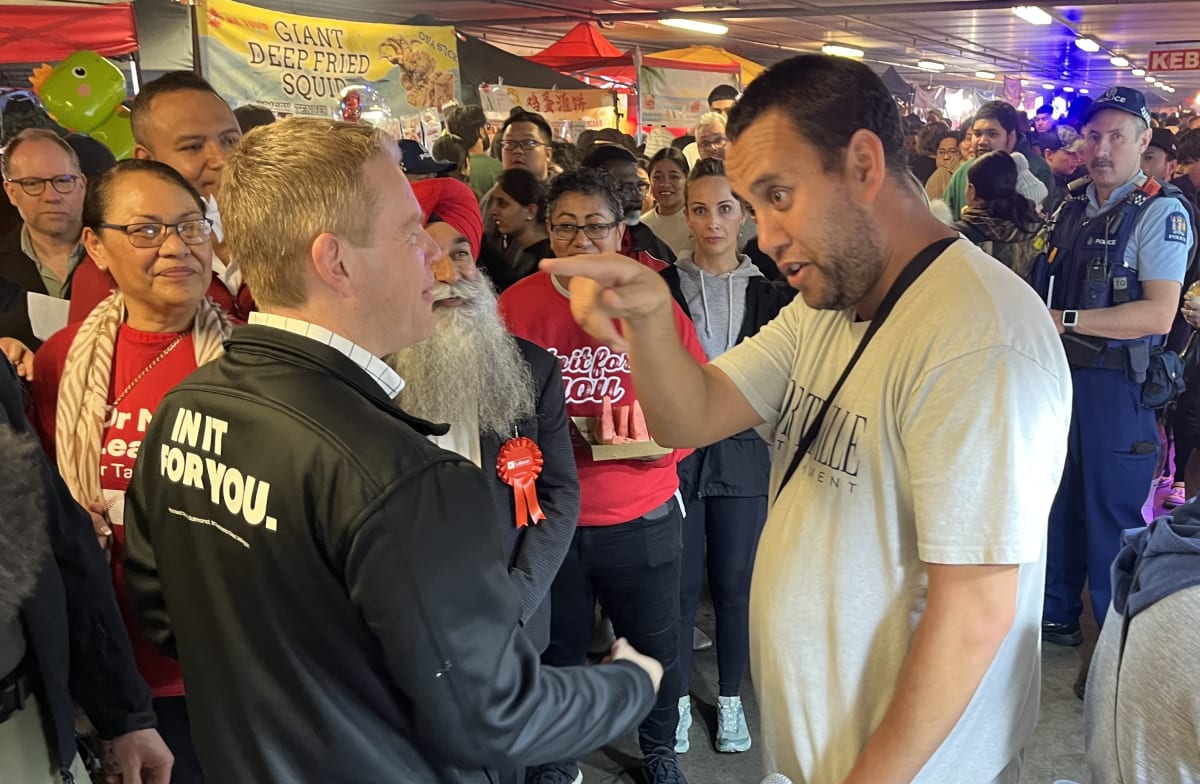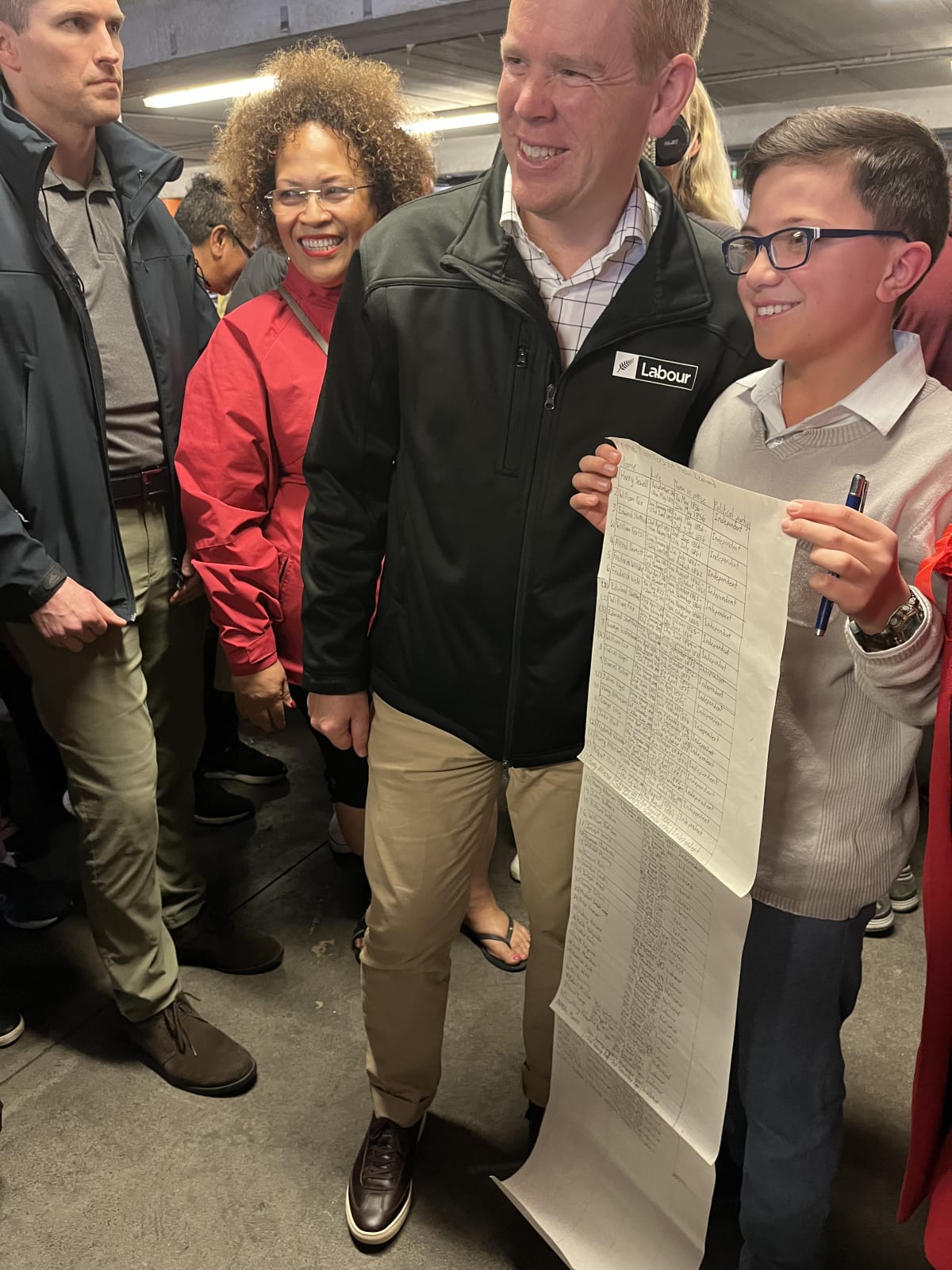
Out of the blue, Chris Hipkins and the governing party find some electoral love, faintly reminiscent of Jacindamania. Tim Murphy joined the throng.
For a man with less likelihood of victory next weekend than the All Blacks against the Irish, Chris Hipkins is innocently, naively or bloody-mindedly upbeat.
And, possibly too late, that wide-eyed hope of a polling u-turn to outdo all Labour u-turns has started to shimmer into reality in his mind.
At the last – after all the hits he's taken from cyclone and pestilence, imploding colleagues, polling at David Cunliffe levels and isolation with Covid – the Labour leader experienced something rare on Saturday night, the fleeting, fervent embrace of electoral excitement.
Underground in a carpark in Pakuranga, one of the bluest National seats in the land, Hipkins was an unlikely political rockstar. Wanted. Selfie'd. Swarmed. Couldn't move more than a few paces without having to fist bump or flash that cheesy smile.
Who saw that coming? Probably Chris Hipkins.
He's been almost deludedly upbeat since his release from isolation at an Auckland hotel on Friday. On Saturday afternoon he was openly talking about turning the whole, sorry, campaign polling story on its head within one week. "I think we're going to surprise people this time next week when we win the election," he told around 90 party volunteers at a phone bank calling potential voters.
That event had a vibrant spirit of its own. But it was loaded with partisans, sharing that cheery delusion of victory in a week.
Hipkins made one phone call. It was impossible to know whether it was truly random or one staged for the correct outcome, but the Labour leader had a 100 percent success rate, recording a vote for Labour.
He told reporters it was not unprecedented in just seven days for Labour to move from eight points behind National to overtaking them and being in a position to negotiate a path to government. Hipkins claims the 2020 election's final week gains for Labour and against National represented a 10-point movement compared with the polls at that time.
He said National had trended down in polls over the past month, the gap between the left bloc and the right blocs had narrowed, and Labour had talked to 130,000 people through the campaign with volunteers primed to maximise their chances over the next week.
At the phone bank, sitting still on 28 percent in the 1 News-Verian poll, and trailing National by that yawning eight points, Hipkins talked a good game.
Hours later, in the insalubrious concrete carparking alleys beneath The Warehouse at Pakuranga, he walked the walk.

In the glory days of Jacindamania, and even Bill English's last few mall and market visits in 2017, the scenes of Saturday night wouldn't have stood out. In that campaign, and for Ardern again even in the era of Covid in 2020 the crowds and celebrity fervour were commonplace.
In 2023, much less so. Security issues and a loss of nerve and interest by the party leaders have led to a dearth of political events in roiling crowds. Hipkins' lack of social small talk made him even less of a crowd magnet than his relatively strait-laced National opponent Christopher Luxon.
It wasn't just passively crowded at Pakuranga. Around Hipkins it was actively energised. The police protection officers had their work cut out monitoring and shepherding the PM as people pressed in from all angles.
The National candidate for Pakuranga, Simeon Brown, was also at the carpark with a troupe of blue-jacketed supporters and they appeared to be attracting a share of attention as well, crossing paths with the Labour group in one, slow chokepoint.
But the interloper, Hipkins, and the outsider party Labour, found something unexpected and, to them, reassuring under the Red Shed. If Hipkins had tried to conjure up a morale booster while lying on his isolation hotel room bed last week, here it was.

One night, one crowd, does not a campaign make. But here was evidence that Hipkins isn't presiding over loserville. And that some voters out there, even at an event in a safe National seat, are far from shunning Labour and its main man.
It also underlined how Labour and Hipkins have left too much, too late this campaign cycle: policy releases, big ideas, bold politicking and risks on the stump.
They'll need the seven-day revolution to occur this week or they'll be left with an excess of what-should-have-beens and what-might-have-beens.
On the National campaign, Newsroom political editor Jo Moir reports from Whanganui:
Christopher Luxon made a short and sweet visit to Whanganui on Saturday morning to visit the River Markets with local candidate Carl Bates.
Luxon arrived on the big blue National bus to rapturous applause from volunteers kitted out in their party jackets.
It was an overall warm response where he chatted with several first-time parents braving the chilly wind and threatening rain with their new babies.
Luxon asked about how they were doing making ends meet on maternity leave and how much interest rates had gone up on their homes.
A middle-aged man bowled up to the National leader early on and had a go at him about cutting the airline service to Whanganui while he was chief executive at Air New Zealand.
The irritated local told the man vying to be Prime Minister that he “wasn’t credible” before walking off to a “have a good day” from Luxon.
At a bakery stall he stopped to get behind the table and serve up some of the sweet treats on offer.
Local MP Stephanie Lewis was waving placards with her Labour Party volunteers from a tent right behind and did her best to creep into shot of cameras as Luxon served customers.
One young girl, aged about eight, ordered a donut and handed Luxon a $20 note.
He quizzed her how much change she would need for a $6 donut and the girl promptly replied, “I don’t know”.
Luxon told her she would be getting $14 and reached for the cash and handed her $16 in notes and coins.
A staffer pointed out his error and he quickly turned around and corrected his mistake.
Asked if this was the sort of maths the country could expect from him if he’s Prime Minister, Luxon replied, “put that down to tiredness and fatigue”.
Ahead of his market visit Luxon had met local iwi leaders to discuss the National Party’s approach to a variety of issues.
Luxon told media he had been “quietly meeting” with iwi leaders across the country over the past year but didn’t go into any great detail as to what had been discussed.







